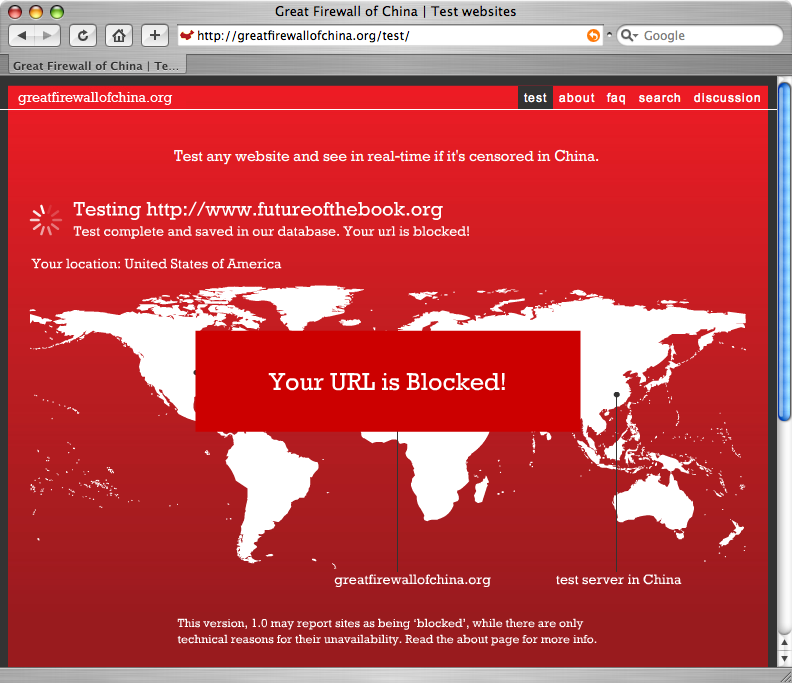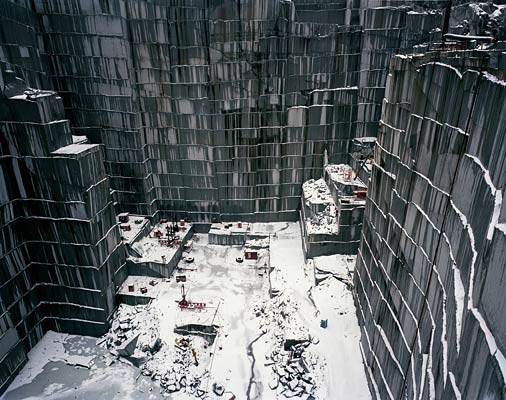I found an interesting project that performs real time tests on websites to determine wether they are blocked by China’s “Great Firewall” and I was (somewhat) surprised to find that our very own blog was filtered:

Our ideas are considered subversive by the Chinese government! We must be must be doing something right (edit: see comments below)!
Any of our readers find their own sites blocked?
Category Archives: china
video (in your own words)
is the slogan of Mojiti, a company based in Beijing which has enabled commenting for video. Users can annotate any video on YouTube, Google, MySpace and about twenty other providers with text, shape and images. the annotations can be animated as well. The interface for making comments is unusually simple and straightforward. On first glance this is an important step forward in web 2.0 applications. [note: the demos all show text fields with solid backgrounds obscuring the video. in fact it’s quite easy to make the text box transparent or to turn off the annotations at any point to see the unalloyed video]
the trouble with wikis in china
I’ve just been reading about this Chinese online encyclopedia, modeled after Wikipedia, called “e-Wiki,” which last month was taken offline by its owner under pressure from the PRC government. Reporters Without Borders and The Sydney Morning Herald report that it was articles on Taiwan and the Falun Gong (more specifically, an article on an activist named James Lung with some connection to FG) that flagged e-Wiki for the censors.

Baidu: the heavy paw of the state.
Meanwhile, “Baidupedia,” the user-written encyclopedia run by leading Chinese search engine Baidu is thriving, with well over 300,000 articles created since its launch in April. Of course, “Baidu Baike,” as the site is properly called, is heavily censored, with all edits reviewed by invisible behind-the-scenes administrators before being published.
Wikipedia’s article on Baidu Baike points out the following: “Although the earlier test version was named ‘Baidu WIKI’, the current version and official media releases say the system is not a wiki system.” Which all makes sense: to an authoritarian, wikis, or anything that puts that much control over information in the hands of the masses, is anathema. Indeed, though I can’t read Chinese, looking through it, pages on Baidu Baike do not appear to have the customary “edit” links alongside sections of text. Rather, there’s a text entry field at the bottom of the page with what seems to be a submit button. There’s a big difference between a system in which edits are submitted for moderation and a totally open system where changes have to be managed, in the open, by the users themselves.
All of which underscores how astonishingly functional Wikipedia is despite its seeming vulnerability to chaotic forces. Wikipedia truly is a collectively owned space. Seeing how China is dealing with wikis, or at least, with their most visible cultural deployment, the collective building of so-called “reliable knowledge,” or encyclopedias, underscores the political implications of this oddly named class of web pages.
Dan, still reeling from three days of Wikimania, as well as other meetings concerning MIT’s One Laptop Per Child initiative, relayed the fact that the word processing software being bundled into the 100-dollar laptops will all be wiki-based, putting the focus on student collaboration over mesh networks. This may not sound like such a big deal, but just take a moment to ponder the implications of having all class writing assignments being carried out wikis. The different sorts of skills and attitudes that collaborating on everything might nurture. There a million things that could go wrong with the One Laptop Per Child project, but you can’t accuse its developers of lacking bold ideas about education.
But back to the Chinese. An odd thing remarked on the talk page of the Wikipedia article is that Baidu Baike actually has an article about Wikipedia that includes more or less truthful information about Wikipedia’s blockage by the Great Firewall in October ’05, as well as other reasonably accurate, and even positive, descriptions of the site. Wikipedia contributor Miborovsky notes:
Interestingly enough, it does a decent explanation of WP:NPOV (Wikipedia’s Neutral Point of View policy) and paints Wikipedia in a positive light, saying “its activities precisely reflects the web-culture’s pluralism, openness, democractic values and anti-authoritarianism.”
But look for Wikipedia on Baidu’s search engine (or on Google, Yahoo and MSN’s Chinese sites for that matter) and you’ll get nothing. And there’s no e-Wiki to be found.
google gets mid-evil
At the World Economic Forum in Davos last Friday, Google CEO Eric Schmidt assured a questioner in the audience that his company had in fact thoroughly searched its soul before deciding to roll out a politically sanitized search engine in China:
We concluded that although we weren’t wild about the restrictions, it was even worse to not try to serve those users at all… We actually did an evil scale and decided not to serve at all was worse evil.
(via Ditherati)
illusions of a borderless world

A number of influential folks around the blogosphere are reluctantly endorsing Google’s decision to play by China’s censorship rules on its new Google.cn service — what one local commentator calls a “eunuch version” of Google.com. Here’s a sampler of opinions:
Ethan Zuckerman (“Google in China: Cause For Any Hope?”):
It’s a compromise that doesn’t make me happy, that probably doesn’t make most of the people who work for Google very happy, but which has been carefully thought through…
In launching Google.cn, Google made an interesting decision – they did not launch versions of Gmail or Blogger, both services where users create content. This helps Google escape situations like the one Yahoo faced when the Chinese government asked for information on Shi Tao, or when MSN pulled Michael Anti’s blog. This suggests to me that Google’s willing to sacrifice revenue and market share in exchange for minimizing situations where they’re asked to put Chinese users at risk of arrest or detention… This, in turn, gives me some cause for hope.
Rebecca MacKinnon (“Google in China: Degrees of Evil”):
At the end of the day, this compromise puts Google a little lower on the evil scale than many other internet companies in China. But is this compromise something Google should be proud of? No. They have put a foot further into the mud. Now let’s see whether they get sucked in deeper or whether they end up holding their ground.
David Weinberger (“Google in China”):
If forced to choose — as Google has been — I’d probably do what Google is doing. It sucks, it stinks, but how would an information embargo help? It wouldn’t apply pressure on the Chinese government. Chinese citizens would not be any more likely to rise up against the government because they don’t have access to Google. Staying out of China would not lead to a more free China.
Doc Searls (“Doing Less Evil, Possibly”):
I believe constant engagement — conversation, if you will — with the Chinese government, beats picking up one’s very large marbles and going home. Which seems to be the alternative.
Much as I hate to say it, this does seem to be the sensible position — not unlike opposing America’s embargo of Cuba. The logic goes that isolating Castro only serves to further isolate the Cuban people, whereas exposure to the rest of the world — even restricted and filtered — might, over time, loosen the state’s monopoly on civic life. Of course, you might say that trading Castro for globalization is merely an exchange of one tyranny for another. But what is perhaps more interesting to ponder right now, in the wake of Google’s decision, is the palpable melancholy felt in the comments above. What does it reveal about what we assume — or used to assume — about the internet and its relationship to politics and geography?
A favorite “what if” of recent history is what might have happened in the Soviet Union had it lasted into the internet age. Would the Kremlin have managed to secure its virtual borders? Or censor and filter the net into a state-controlled intranet — a Union of Soviet Socialist Networks? Or would the decentralized nature of the technology, mixed with the cultural stirrings of glasnost, have toppled the totalitarian state from beneath?
Ten years ago, in the heady early days of the internet, most would probably have placed their bets against the Soviets. The Cold War was over. Some even speculated that history itself had ended, that free-market capitalism and democracy, on the wings of the information revolution, would usher in a long era of prosperity and peace. No borders. No limits.


“Jingjing” and “Chacha.” Internet police officers from the city of Shenzhen who float over web pages and monitor the cyber-traffic of local users.
It’s interesting now to see how exactly the opposite has occurred. Bubbles burst. Towers fell. History, as we now realize, did not end, it was merely on vacation; while the utopian vision of the internet — as a placeless place removed from the inequities of the physical world — has all but evaporated. We realize now that geography matters. Concrete features have begun to crystallize on this massive information plain: ports, gateways and customs houses erected, borders drawn. With each passing year, the internet comes more and more to resemble a map of the world.
Those of us tickled by the “what if” of the Soviet net now have ourselves a plausible answer in China, who, through a stunning feat of pipe control — a combination of censoring filters, on-the-ground enforcement, and general peering over the shoulders of its citizens — has managed to create a heavily restricted local net in its own image. Barely a decade after the fall of the Iron Curtain, we have the Great Firewall of China.
And as we’ve seen this week, and in several highly publicized instances over the past year, the virtual hand of the Chinese government has been substantially strengthened by Western technology companies willing to play by local rules so as not to be shut out of the explosive Chinese market. Tech giants like Google, Yahoo! , and Cisco Systems have proved only too willing to abide by China’s censorship policies, blocking certain search returns and politically sensitive terms like “Taiwanese democracy,” “multi-party elections” or “Falun Gong”. They also specialize in precision bombing, sometimes removing the pages of specific users at the government’s bidding. The most recent incident came just after New Year’s when Microsoft acquiesced to government requests to shut down the My Space site of popular muckraking blogger Zhao Jing, aka Michael Anti.

One of many angry responses that circulated the non-Chinese net in the days that followed.
We tend to forget that the virtual is built of physical stuff: wires, cable, fiber — the pipes. Whoever controls those pipes, be it governments or telecomms, has the potential to control what passes through them. The result is that the internet comes in many flavors, depending in large part on where you are logging in. As Jack Goldsmith and Timothy Wu explain in an excellent article in Legal Affairs (adapted from their forthcoming book Who Controls the Internet? : Illusions of a Borderless World), China, far from being the boxed-in exception to an otherwise borderless net, is actually just the uglier side of a global reality. The net has been mapped out geographically into “a collection of nation-state networks,” each with its own politics, social mores, and consumer appetites. The very same technology that enables Chinese authorities to write the rules of their local net enables companies around the world to target advertising and gear services toward local markets. Goldsmith and Wu:
…information does not want to be free. It wants to be labeled, organized, and filtered so that it can be searched, cross-referenced, and consumed….Geography turns out to be one of the most important ways to organize information on this medium that was supposed to destroy geography.
Who knows? When networked devices truly are ubiquitous and can pinpoint our location wherever we roam, the internet could be censored or tailored right down to the individual level (like the empire in Borges’ fable that commissions a one-to-one map of its territory that upon completion perfectly covers every corresponding inch of land like a quilt).
The case of Google, while by no means unique, serves well to illustrate how threadbare the illusion of the borderless world has become. The company’s famous credo, “don’t be evil,” just doesn’t hold up in the messy, complicated real world. “Choose the lesser evil” might be more appropriate. Also crumbling upon contact with air is Google’s famous mission, “to make the world’s information universally accessible and useful,” since, as we’ve learned, Google will actually vary the world’s information depending on where in the world it operates.
Google may be behaving responsibly for a corporation, but it’s still a corporation, and corporations, in spite of well-intentioned employees, some of whom may go to great lengths to steer their company onto the righteous path, are still ultimately built to do one thing: get ahead. Last week in the States, the get-ahead impulse happened to be consonant with our values. Not wanting to spook American users, Google chose to refuse a Dept. of Justice request for search records to aid its anti-pornography crackdown. But this week, not wanting to ruffle the Chinese government, Google compromised and became an agent of political repression. “Degrees of evil,” as Rebecca MacKinnon put it.
The great irony is that technologies we romanticized as inherently anti-tyrannical have turned out to be powerful instruments of control, highly adaptable to local political realities, be they state or market-driven. Not only does the Chinese government use these technologies to suppress democracy, it does so with the help of its former Cold War adversary, America — or rather, the corporations that in a globalized world are the de facto co-authors of American foreign policy. The internet is coming of age and with that comes the inevitable fall from innocence. Part of us desperately wanted to believe Google’s silly slogans because they said something about the utopian promise of the net. But the net is part of the world, and the world is not so simple.
hacking nature

Slate is trying something new with its art criticism: a new “gallery” feature where each month an important artist will be discussed alongside a rich media presentation of their work.
…we’re hoping to emphasize exciting new video and digital art–the kind of art that is hard to reproduce in print magazines.
For their first subject, they don’t push the print envelope terribly far (just a simple slideshow), but they do draw attention to some stunning work by Canadian photographer Edward Burtynsky, who (happily for us New Yorkers) has shows coming this week to the Brooklyn Museum and the Charles Cowles Gallery in Manhattan. Burtynsky documents landscapes bearing the mark of extreme human exploitation – the infernal streams flowing from nickel mines, junked ocean liners rusting in chunks on the beach, abandoned quarries ripe with algae in their cubic trenches, and an arresting series from recent travels through China’s industrial belt.
These photographs carry startling information through the image-surplussed web. But Burtynsky disappoints in one vital, perhaps deciding, respect:
…his position on the moral and political implications of his work is studiously neutral. He doesn’t point fingers or call for change; instead, he accepts industry’s exploitation of the land as the inevitable result of modern progress. “We have extracted from the land from the moment we stood on two feet,” he said in an interview in the exhibition catalog. “The entire 20th century has been a revving up of this large consumptive engine. It’s not a question of whether we are going to stop consuming. It’s not going to happen…”
As someone who believes that struggling to prevent (or at least mitigate) global ecological disaster should be the transcending narrative of our times, I find Burtynsky’s detachment deeply depressing and self-defeating. His images glory in the sick beauty of these ravaged scenes, and the cultural consumers that will no doubt pay large sums for these photographs at his upcoming Chelsea show only compound the cynicism.
“bringing karaoke to literature”

Shanghai Daily reports on a Chinese “mini novel” contest where writers submit bite-sized narratives (350 words or less) by text message.
Commenting on the contest, well-known writer Yu Hua says: “To hold the competition is like bringing ‘karaoke’ to literature. Before the invention of karaoke, there were only few people who could or would sing in public. Thanks to karaoke, anyone and everyone can sing in public whenever they feel like it. Now, thanks to the mobile phone, the same is true with writing.
The karaoke analogy is apt, and a bit scary.
(via textually)
